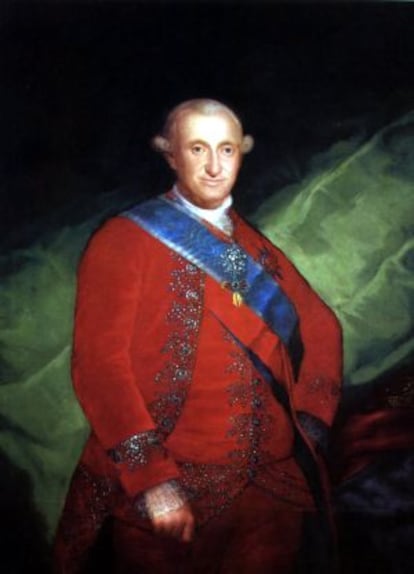Raquel, the illegitimate countess
Judge denies the right of a woman born out of wedlock to inherit a noble title The decision puts a royal decree from 1791 before the Constitution and civil code

Last December in a court in Badajoz the law as it existed in the times of Charles IV, who reigned from 1788 to 1808, took precedence over that enshrined in the Constitution of 1978 after the restoration of democracy. A judge in the southwestern city in the region of Extremadura rejected the right of a young woman, Raquel M. G., to inherit the title of Conde de Casa Ayala from her biological father, Pedro Muguiro y Morales-Arce.
In doing so the judge ignored the precept of the equality of rights between marital and extramarital children established by the 1978 Constitution and the current civil code and rejected the plaintiff's petition. Why? Because the royal decree by which Charles IV created the title in 1791 establishes that the holders of the title must be legitimate children.
The young lady, who is now 21, filed a suit against her father on July 15, 2011 to secure legal recognition of his paternity. But only three months after the suit was filed, Pedro Muguiro, then Count of Casa Ayala, decided to cede his title to his brother, Alejandro Muguiro. In February 2012, the court ruled in favor of Raquel, as being Pedro's daughter, but seven months later, on September 12, 2012, King Juan Carlos signed a letter blessing the cession agreed upon by the two brothers.
However, the daughter decided to claim the title as the legitimate heiress. "She is perfectly aware that it is only honorific, but considers that she has a right to inherit it," say sources in her circle. Raquel considers that the cession was designed solely to deprive her of it.
The young woman has decided to appeal the judge's ruling
However, Judge Raquel Rivas Hidalgo of the Court of First Instance in Badajoz ruled against her, arguing that the father is in the right, and that the young woman lacks the right to succession because in the terms of the decree by which Charles IV created the title, succession to it is the right of "sons, heirs and successors born of legitimate matrimony," which does not apply to Raquel since she was born out of wedlock.
All this, in spite of the fact that Article 39 of the Constitution accords equal rights of inheritance to children, whether or not born they are born out of wedlock. Article 108 of the civil code incorporates this precept, establishing that "matrimonial and non-matrimonial filiation, and adoptive filiation, shall have the same effects in accordance with the provisions of the present code."
The judge considers that when it comes to questions of establishing noble rank, the system for handing down a title from one generation to another or ceding that title is that which is set forth by royal decree, in this case the one signed by Charles IV in 1791. And she further grounds her decision on two laws that predate the 1978 Constitution - the decree of June 1948 passed during the regime of the dictator Francisco Franco and that of October 1820 promulgated in the reign of Ferdinand VII, which is expressed in similar terms. However, there is a clause in the current Constitution which establishes that "all previous dispositions opposed to the terms of the Constitution" shall be without effect.
More specifically, the law of equality between men and women in terms of inheriting a noble title passed in 2006 invalidates any clauses of discrimination on grounds of sex as being contrary to the equality principle established in the Constitution. But, according to the Badajoz judge, it is not applicable to this case, because this law, passed under the mandate of former Socialist Prime Minister José Luis Rodríguez Zapatero, does not expressly mention the case of extra-marital children.
Judge Rivas, therefore, argues that the rights of the co-defendant Alejandro Muguiro, to whom his brother Pedro Muguiro ceded the title of Conde de Casa Ayala, have preference over those of the plaintiff. However, the magistrate acknowledges that the Supreme Court has yet to establish jurisprudence in cases of this nature.
The young woman has decided to appeal the judge's ruling on the grounds that it is "contrary to the principle of equality, discriminatory and unconstitutional."
"It is very difficult to show how in the 21st century precedence may be given to a norm that expressly discriminates against children born out of matrimony, depriving them of the rights they would have were their parents married," reads her appeal, which has been lodged with the Provincial High Court of Badajoz.
Tu suscripción se está usando en otro dispositivo
¿Quieres añadir otro usuario a tu suscripción?
Si continúas leyendo en este dispositivo, no se podrá leer en el otro.
FlechaTu suscripción se está usando en otro dispositivo y solo puedes acceder a EL PAÍS desde un dispositivo a la vez.
Si quieres compartir tu cuenta, cambia tu suscripción a la modalidad Premium, así podrás añadir otro usuario. Cada uno accederá con su propia cuenta de email, lo que os permitirá personalizar vuestra experiencia en EL PAÍS.
¿Tienes una suscripción de empresa? Accede aquí para contratar más cuentas.
En el caso de no saber quién está usando tu cuenta, te recomendamos cambiar tu contraseña aquí.
Si decides continuar compartiendo tu cuenta, este mensaje se mostrará en tu dispositivo y en el de la otra persona que está usando tu cuenta de forma indefinida, afectando a tu experiencia de lectura. Puedes consultar aquí los términos y condiciones de la suscripción digital.








































